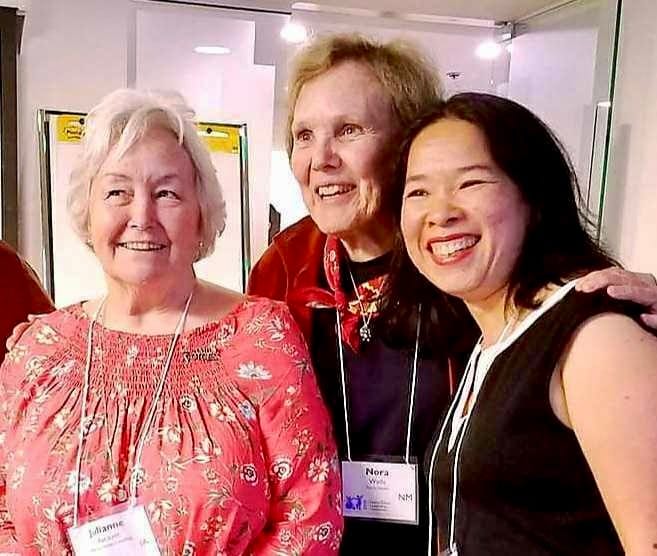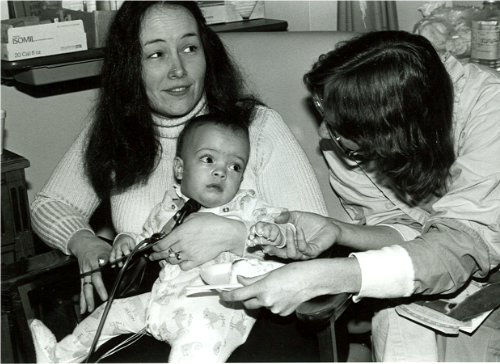Remembering Julie Beckett: Discovering Our Strength

L to R, Julie Beckett, Nora Wells (Exec Dir of Family Voices) and Elena Hung. [image description: Three women wearing professional clothing and wearing name tags pose at a conference.]
Little Lobbyists honors the passing of an advocate who changed our children’s lives: Julie Beckett, the mother of Katie Beckett, for whom a crucial Medicaid waiver is named. Julie and Katie Beckett became advocates for people with disabilities because they wanted justice and a good life for Katie and all disabled people.
Julie wrote, “As many parents will attest, there sometimes comes a moment in parenting where you discover strength you didn’t know you had — all because your child needs you.” We at Little Lobbyists have felt that same call.
Little Lobbyists Executive Director and Co-Founder Elena Hung knew Julie Beckett and was, understandably, awed:
“Julie always spoke about Katie as her partner in advocacy. The last time I saw her, I was struck by how many of her stories and memories were about ‘we’ and ‘us’ and ‘Katie and I.’ It was never just about Julie or Katie, but about the two of them together. It's something that really spoke to me as I feel the same way about Xiomara and why I am so adamant about describing Little Lobbyists as a ‘family-led’ organization and not ‘parent-led.’ In my opinion, I think this is a defining narrative of Julie's advocacy: fighting for justice with her daughter and not for her.”
Julie and Katie were founders of Family Voices, whose mission is to promote “partnership with families–including those of cultural, linguistic and geographic diversity—in order to improve healthcare services and policies for children.” Of Julie’s passion, Family Voices said, “May it inspire each of us to recognize the power of our voices to improve the world around us.”
Julie’s daughter Katie was born in Iowa in 1978. At the age of four months, Katie contracted viral encephalitis, which caused complex respiratory problems and partial paralysis. Katie needed a ventilator to breathe, and, according to Medicaid rules at that time, people who needed a ventilator could only be cared for in a hospital. Katie could not be cared for at home, where she belonged. Within our lifetime, disabled children were still automatically institutionalized.
For three long years, Julie fought the state and federal governments, seeking a way to bring Katie home, where she would be surrounded by love and where she would ultimately thrive.

Family Voices photo: Julie and Katie (as an infant) [image description: A black and white photo of a woman with long dark hair holding an infant who has a tracheostomy tube. Another woman, whose face is not visible, holds a toy out to the infant.]
Julie and Katie joined the same cause disabled activists had been working on for decades: the right to live in their communities with dignity and respect, and to live full and happy lives. When Medicaid was established in 1965 as part of the Social Security Act, the program guaranteed that people who needed 24/7 care, i.e., nursing-level care, could receive it in an institution or hospital with no waiting list. But no one had the right to receive care at home.
Julie Beckett reached out to everyone she knew. She told Katie’s story over and over again. Because of Julie’s refusal to give up, in 1981 Katie’s story caught the attention of new president Ronald Reagan. The president saw the Beckett family’s plight as an issue of burdensome federal regulations. He also recognized what the disability community had been saying for many years: home care costs far less than institutional care.
In 1983, Congress amended the Social Security Act to allow states to “waive” Medicaid’s institutional care restrictions to provide home care. Katie Beckett came home. Katie Beckett lived in her community until she passed away at the age of 34.
Today, all 50 states have a “Katie Beckett waiver,” which allows eligible children to live with their families, in their communities with the health care and adaptive supports they need. This waiver saves state and federal governments hundreds of millions of dollars annually, but there are still 800,000 people on state waiting lists to receive home care. When you live at home, surrounded by your loved ones, your health outcomes are better–there are fewer costly hospital stays. Julie Beckett wrote, “This waiver meant so much for us and for Katie that I proudly display “waiver mom” in my email address to this day.”
But, as Julie and Katie knew, the rights of disabled people are constantly under attack. While Reagan recognized the value of home care, today’s Republicans have tried, time and again, to gut Medicaid and turn back time to the ugly days of institutionalization.
Our work is not yet finished: To this day, neither states nor the federal government have made Home and Community-Based Services (HCBS) a right instead of a “waiver” or “demonstration” program. For how much longer do we need to “demonstrate” that our disabled loved ones, both children and adults, survive and thrive at home, where they belong?
It’s been nearly 40 years since Congress created these essential waiver programs. President Biden’s Better Care Better Jobs Act would provide enough funding to reduce or eliminate agonizing waiting lists, raise home workers’ wages, and create more jobs.
Julie and Katie Beckett knew they had helped to create change, but they also knew their work wasn’t finished. We all must fight on. “You are not required to complete the work of perfecting the world, but neither are you free to abandon it.”
